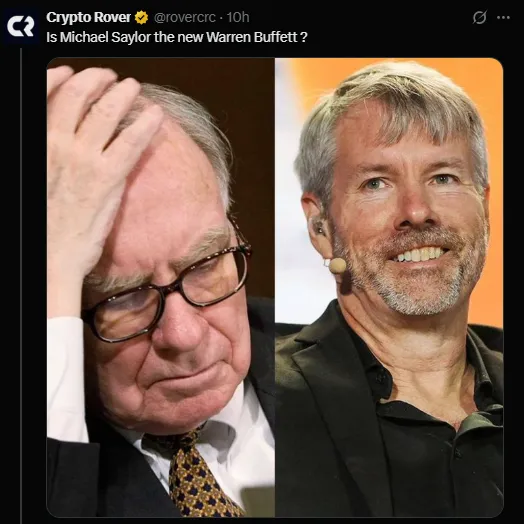
Michael Saylor, the current executive chairman of MicroStrategy, is probably one of those most polarizing personalities of modern finance. His all-in approach to Bitcoin has redefined corporate strategy—and has prompted comparisons to the illustrious Warren Buffett. But is Saylor truly the "new Warren Buffett," or is he forging a path all his own?

To analyze this industry-gasping question, let us take an analysis of the two against the dimensions of investment style, company operation, market effect, and capital allocation.
Warren Buffett, the "Oracle of Omaha," built his fortune around one concept: value-based investing. His approach is to identify companies that are undervalued, with good cash flows and strong competitive positions, or economic moats, like Coca-Cola, Apple, and American Express.
Buffett is averse to speculation, and on Bitcoin said it was "rat poison squared." For him, value is determined first and foremost in terms of productive assets, and only secondarily through price appreciation.
In contrast, Saylor has banked MicroStrategy principally on Bitcoin. He looks at Bitcoin not as a speculative token but as "digital gold," the highest store of value in this age of fiat debasement. His mantra is: "Don't melt in fiat—buy more Bitcoin." While Buffett prefers a broad diversification of risks, Saylor has concentrated his. That said, both men also display that one characteristic shared by most transformational investors: extreme conviction.
Buffett's Berkshire Hathaway is worth $1.09 trillion. It owns insurance giants like GEICO, utilities such as PacifiCorp, and also holds a number of stock positions in publicly traded companies. The steady cash flow cushioned long-term, low-risk compounding, providing consistency and capital preservation to the shareholders.
MicroStrategy tells an opposite story. Once known for enterprise software, it has since been recognized as a corporate Bitcoin whale. As of May 2025, MicroStrategy holds over 580,250 BTC, worth more than $63 billion-close to 2.97% of the total supply of Bitcoin.
Financing of these purchases has been done by Saylor through a mixture of debt, convertible bonds, and equity offerings. This high-stakes, high-leverage method renders MicroStrategy more volatile than a traditional software house—and something that Buffett would never put his name to.
Since August of 2020, MicroStrategy ($MSTR) shares have risen over 2,700%, far exceeding Bitcoin's 1,100% gain and handily beating out Berkshire Hathaway's 160% increase. Yet the ride for $MSTR has been anything but smooth.
During the bear run of 2022, MicroStrategy stock tumbled more than 60% in a way that tried to test investor patience. Finally, it rallied powerfully with Bitcoin in 2024 and 2025.
Meanwhile, Berkshire demonstrated all its hold-your-own stability with approximately 20% CAGR and minimal volatilities. In literal words, MicroStrategy is a rocket while Berkshire is a freight train.
At the very cradle of global finance stands Warren Buffett. The shareholder letters he pens are treated as gospel. This man moves markets; institutional investors and hedge fund managers keep quoting him.
The reach of Saylor is, in some way, different from (but just as impactful as) Buffett's. Saylor is a regular feature on crypto podcasts, Twitter Spaces, and financial media, where his forecast is always the same: Bitcoin surpasses $1-million. Whenever he goes out in public to purchase BTC, the prices follow upon the upward trend, and corporate treasuries jump aboard.
Buffett changes the tides for Wall Street. Saylor causes disruptions to the blockchain world.
No doubt, Buffett is capital conservative. He keeps large cash reserves and only deploys capital when assets are attractively priced. He prefers buybacks to dividends and would never tolerate dilution.
Saylor is quite the contrary. He would see fiat currency as a melting ice cube with Bitcoin being its ultimate hedge. He raises money aggressively through debt and equity, just to continue to buy BTC at scale. For him, dilution is justifiable if it means stacking more of this "digital gold."
In the traditional sense, no. Buffett and Saylor exist in different worlds: one in philosophy, risk appetite, and asset choice.
Buffett looks at productive assets, long-term cash flows, and business fundamentals. Saylor bets on Bitcoin's exponential future: a non-cash-generating asset, facilitated by global adoption and scarcity.
But deeper down, they share fundamental traits. Both are high-conviction thinkers. Both built their companies around a core belief. Both have had loyal followings of investors. And in their eras, they became the front-liners of their investment crowd: Buffett during an industrial-capitalist age, Saylor during an age of digital assets.
Michael Saylor is not simply a new version of Warren Buffett. He represents a fresh approach—a corporate strategist focused on Bitcoin who has transformed how capital is deployed in the digital era.
If Bitcoin’s value keeps rising, Saylor will be celebrated as a visionary who anticipated the future early. If Bitcoin falters, some may see his strategy as risky. Regardless of what happens, one thing is undeniable: Michael Saylor has firmly established his legacy—not by following Buffett’s footsteps, but by forging his own unique path.

Lokesh Gupta is a seasoned financial expert with 23 years of experience in Forex, Comex, NSE, MCX, NCDEX, and cryptocurrency markets. Investors have trusted his technical analysis skills so they may negotiate market swings and make wise investment selections. Lokesh merges his deep understanding of the market with his enthusiasm for teaching in his role as Content & Research Lead, producing informative pieces that give investors a leg up. In both conventional and cryptocurrency markets, he is a reliable adviser because of his strategic direction and ability to examine intricate market movements. Dedicated to study, market analysis, and investor education, Lokesh keeps abreast of the always-changing financial scene. His accurate and well-researched observations provide traders and investors with the tools they need to thrive in ever-changing market conditions.